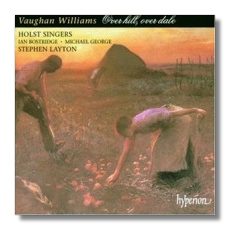
The Internet's Premier Classical Music Source
Related Links
- Vaughan Williams Reviews
- Latest Reviews
- More Reviews
-
By Composer
-
Collections
DVD & Blu-ray
Books
Concert Reviews
Articles/Interviews
Software
Audio
Search Amazon
Recommended Links
Site News
 CD Review
CD Review
Ralph Vaughan Williams

Over Hill, Over Dale
- Five English Folksongs
- Three Shakespeare Songs
- Three Elizabethan Partsongs
- Down among the dead men
- Rest
- Heart's Music
- Come away, Death
- Fugitive folksong choral arrangements
Ian Bostridge, tenor
Michael George, bass
Holst Singers/Layton
Hyperion CDA66777
Hubert Parry, Vaughan Williams' beloved teacher, advised him to write choral music "as befits an Englishman and a democrat" – advice Vaughan Williams certainly took to heart. He composed it throughout his career, major and minor works, for all kinds of groups. For me, after he shakes off his juvenalia, he's a master of the genre. In effect, there really isn't a single, pre-fab "choral style" in Vaughan Williams, and this disk suffers from an attempt to mix them. All the folksong pieces, for example, call for a small, madrigal group, certainly no more than sixteen singers, better one or three to a part, certainly not the comparatively mammoth sound of the twenty-seven voices of the Holst Singers. For example, in the Five English Folksongs, among the composer's most elaborate settings, the intricate counterpoint drowns in a wash of sound. For the other stuff, the Holst Singers are at proper strength.
Problems remain, however. The sopranos sing raw, under the mistaken impressions that they have the most interesting part all the time and that they're actually hitting the pitches Vaughan Williams wrote. The works for men alone – "Seeds of Love," a rarely-met arrangement of "Bushes and Briars," and "The Winter is gone" – come off beautifully. I also object to some of the tempi Layton adopts. Nothing really skips, "Acre of Land" and "Ca' the yowes" lie there like blancmanges. The music that moves by stately chords usually does best, and the Three Shakespeare Songs also come off successfully, particularly the gravely beautiful "The cloud-capp'd towers," which by no coincidence at all moves by stately chords.
My favorite recordings of this repertoire, unfortunately, have never made the transfer to CD: the Deller Consort and the London Madrigal Singers led by Christopher Bishop. The latter in particular is an eye-opener to what really good musicians can accomplish in vocal ensemble.
Copyright © 1996, Steve Schwartz


















